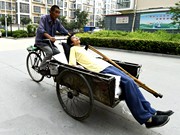

BEIJING, June 28 -- Chinese Premier Li Keqiangleft Beijing on Sunday morning for the 17th China-EU leaders' meeting in Brussels and an official visit to France, accompanied by his wife Cheng Hong.
During his stay in Brussels, Li will co-chair the China-EU leaders' meeting with President of the European Council Donald Tusk and European Commission President Jean-Claude Juncker. Li will also meet with Belgian Prime Minister Charles Michel.
After the Brussels trip, Li will visit France at the invitation of French Prime Minister Manuel Valls. In Paris, the premier will also deliver a speech at the headquarters of the Organization of Economic Cooperation and Development (OECD).
PROVIDING NEW OPPORTUNITIES FOR CHINA-EU RELATIONS
Currently, both China and Europe are facing the tasks of maintaining a steady economic growth and optimizing their economic structure. If China, the largest developing country, and the EU, the largest group of developed countries, will connect each other's development strategies, it will push forward growth of both sides and usher in new opportunities for China-EU ties.
Thus, connecting Chinese and EU development strategies has become one of the highlights of Li's Europe visit.
So as to deepen the integration of Chinese economy with global economy and promote common development, China has proposed the "Belt and Road" initiative, which received applause from the countries along the routes.
Meanwhile, the EU, which is located on the west of the Silk Road Economic Belt, is embracing structural reforms to shake off the shadow of the debt crisis.
Last November, European Commission President Jean-Claude Juncker presented the Investment Plan for Europe, the so-called "Juncker Plan," which is designed to stimulate 315 billion euros of investment for the EU to support innovative projects and infrastructure update.
In a recent interview with Xinhua, Junker said that the EU expects to explore synergies between the "Juncker Plan" and the China-proposed "Belt and Road" initiative.
"The benefits (of the "Belt and Road" initiative) are not just for China itself; Europe, too, stands to benefit from better connections with Asia's dynamic economies," he said.
Zhao Junjie, a research fellow at the Institute of European Studies of Chinese Academy of Social Sciences, said that China-EU relations have entered a period of in-depth development, which requires both sides to enrich the content of the China-EU comprehensive strategic partnership through major cooperation projects.
The alignment of the "Belt and Road" initiative and the "Juncker Plan" will combine the interests of both sides and help China and the EU achieve win-win cooperation and form a community of interests, Zhao said.
OPENING NEW AREAS FOR PRODUCTION CAPACITY COOPERATION
Another key word for Li's trip will be the China-EU cooperation on production capacity. During recent overseas visits, Li has been making efforts to promote international cooperation on production capacity, which in the current world situation helps boost the recovery of global economy and explore new ways of expanding both South-South and South-North cooperation.
The China-EU production capacity cooperation is win-win and complementary, and a kind of important innovation in South-North collaboration. While such cooperation meets the European Union's needs for improving infrastructure, it can combine the two sides' advantages for jointly exploring a third-party market.
The EU's "Juncker Plan" involves the fields of transport, energy, infrastructure construction, where China can offer its production capacity, technology and personnel advantages for deepening bilateral cooperation on production capacity, said Huang Wei, a fellow researcher at the Institute of World Economics and Politics under the Chinese Academy of Social Sciences.
Compared with traditional trade, the cost of inputs in production capacity cooperation is generally higher, but its input-output ratio is also higher, Zhao said.
The continuous expansion of the China-EU production capacity indicates that bilateral economic cooperation has been lifted to a higher level, from traditional trade areas to high-tech and high value-added products fields. This not only helps enhance practical cooperation between China and Europe, but also can chart the course of the development of the China-EU relationship, he added.
During Li's visit, the two sides will ink more than 70 deals worth several scores of billions of U.S. dollars, many of which will be related to the production capacity cooperation.
Experts say the visit will help the two sides reach new consensus on the top-level design of the production capacity cooperation, formulate new guidelines for future interaction and raise bilateral production capacity cooperation to a new high.
CREATING NEW HIGHLIGHTS IN BILATERAL COOPERATION
Besides advancing China-EU ties, the upcoming visit will also further promote China's relations with Belgium and France, making them new highlights in bilateral cooperation.
During the premier's visit to Belgium, both sides will sign cooperation deals on finance, telecommunication, technology and education after the talks between Li and Belgian Prime Minister Charles Michel.
Zhang Yuanyuan, former Chinese ambassador to Belgium, said that the deepening cooperation between the two countries in various fields will play an exemplary role in developing China-EU relations.
During Li's stay in France, the two sides will sign several deals covering nuclear energy, aviation, finance, agriculture and health care. The two sides will also issue a joint statement on third-party market cooperation and a joint statement on civil nuclear energy cooperation.
Former Ambassador to France Zhao Jinjun said strengthening bilateral ties is not only conducive to the development of China and France, but also to the world peace and prosperity.
 |
Day|Week

 Father’s love is like a mountain
Father’s love is like a mountain Walnut too hard for cellphone screen
Walnut too hard for cellphone screen Girls in leaf bikinis perform pole dance on the beach
Girls in leaf bikinis perform pole dance on the beach Fascinating images of Jiuzhaigou Valley
Fascinating images of Jiuzhaigou Valley "Levitating" pole dancer
"Levitating" pole dancer Special armed police attend 'devil trainings' in Hunan
Special armed police attend 'devil trainings' in Hunan Top 10 terrifying tourist sites in China
Top 10 terrifying tourist sites in China Beautiful and smart - post-90s college teacher goes viral
Beautiful and smart - post-90s college teacher goes viral